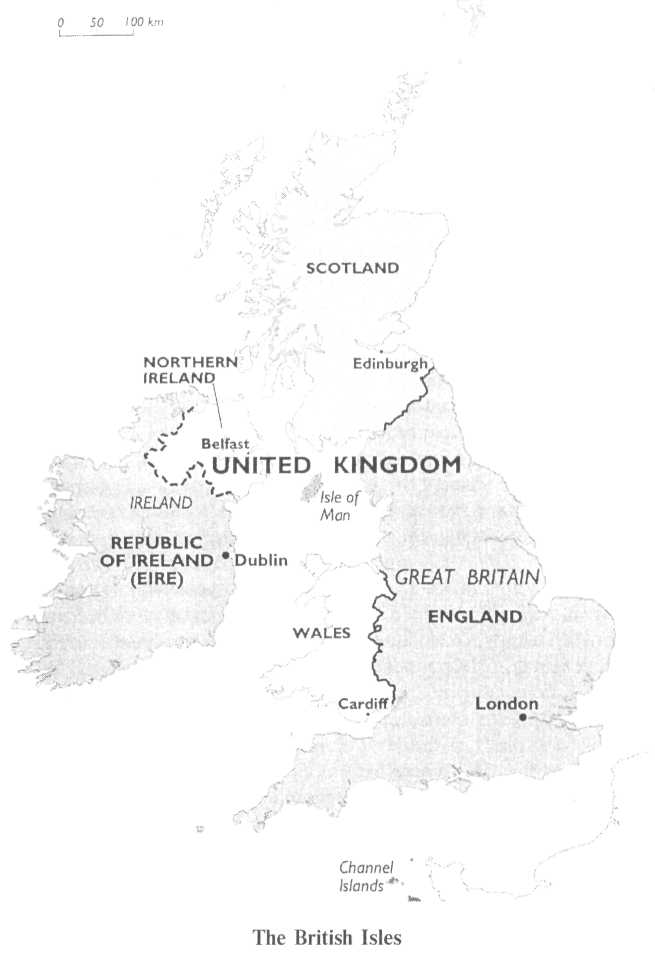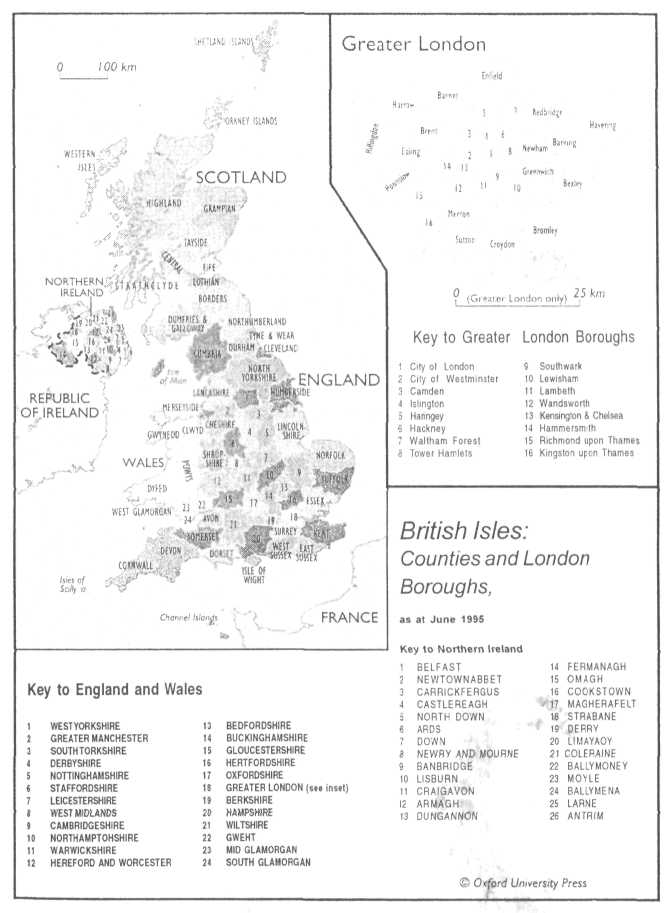
- •1. Spelling
- •. Vocabulary and idiom
- •2. Pronunciation
- •Tasks and exercises
- •1.3. British English
- •1.6. British regional and national shibboleths
- •1.2. The United Kingdom today
- •Tasks and exercises
- •Tasks and exercises
- •Tasks and exercises
- •Summary exercises
- •2.1.2. Raising and tensing of short 'a'
- •Tasks and execises
1.2. The United Kingdom today
The homeland of the English language - the area in which the language first developed as English is known as the British Isles: the two main islands are Britain (some 230,000 sq. km.) and Ireland (some 85,000 sq. km.) and the others are much smaller in size, including the Isle of Man, which lies between Britain and Ireland, as well as many offshore islands close to Britain and Ireland.
The island of Britain is sometimes referred to as Great Britain. This name was originally not motivated by any sense of imperial grandeur but to distinguish the island of Great Britain from an area in western France known as Less Britain (compare modern Brittany, French Bretagne). The people known to the Romans as Britanni were Celts who at one time occupied both Britain and Brittany, hence the need to distinguish the two Celtic territories.

England, Scotland, Wales and Northern I reland form together a nation whose correct title is the United Kingdom of Great Britain and Northern Ireland. This title is often abbreviated as the U nited Kingdom or the U K. It is common to refer to the country as Britain or Great Britain, but in some contexts it may not be clear whether this means the full UK or just the island of Britain. Many people also say England when they mean to refer to the entire U К, but this is particularly unfortunate. The people of Scotland, Wales and Northern Ireland have every reason to object to the practice: they are citizens of the UK and are in some sense British, but they are not English.
The four states making up the UK have important traditions and parliament until 1707. To this day there are differences between the Scottish and English legal systems, Scotland prints its own banknotes (although they have values in U К pounds sterling) and there is a distinct tradition of Scottish pronunciation of English, which most Scottish people feel to be a legitimate part of their heritage. It is nevertheless fair to say that England is the dominant country within the UK and that London, the capital of both England and the UK, is dominant as its largest city. The population of England, at over 48 million, is far larger than that of Scotland (just over 5 million), Wales Gust under 3 million) and Northern Ireland (about 1.5 million). London, with a population of around 7 million people (not including the millions more who live close to London and either work in London or are in other ways economically tied to the city) is itself larger than any of the non-English countries of the UK. As such figures may suggest, it is England, governed from London, that has, at various stages of history, conquered, incorporated and absorbed the other areas of the British Isles. Indeed, the whole of Ireland was at one time brought into the U K, and it is only since 1921 that the southern part of Ireland has been once more independent from the UK and only in 1949 that this territory became the Republic of Ireland. From the long-term perspective of many residents of the British Isles, England has been as much a colonizing power within the British Isles as it has across the oceans.
The U К is now widely regarded by its own citizens as well as others as a country of long tradition and stability, and the very contrast between the old 'homeland' of English and the newer English-speaking countries invites people to think of the UK as old (perhaps negatively as staid and old-fashioned, perhaps positively as solid and stable) in opposition to, say, Australia or the USA as young (perhaps negatively as brash and naive, perhaps positively as fresh and dynamic).
It would be quite wrong to assume that the changes in industry, public administration, health and education were accomplished as a smooth, universally accepted transition, and Britain today is not as smugly self-confident as this little sketch might suggest. Europe increasingly dominates the thinking of modern 'Brits' (as they are sometimes called by other English-speaking people). They have become more inclined to learn languages than their American cousins across the Atlantic, and the different regions of the UK, outside England, have begun to assert themselves. Scotland has its own parliament again (established in 1999) and Wales, at last, a similar institution, though without the power to raise taxes. For the first time, some of the English are asking themselves whether they should have their own English parliament and a special identity like that of the Scots and the Welsh. Perhaps the truth of the matter is that Britain is in transition and the behaviour of the British contains elements of both their former self-confidence and their current insecurity. Since the 1960s, they have shown an ability to produce startling innovations in music, fashion, science and technology while at the same time holding on to many of the old traditions. To everyone's surprise, for example, and despite the wave of criticism of the Royal Family's treatment of Diana, Princess of Wales, there is no sign that the monarchy is genuinely under threat. While Australians debate the possibility of becoming a republic, an apparently archaic institution like the British monarchy, with all its quaint trappings, has a chance of surviving in its country of origin.

Counties, boroughs, parishes
Counties are the oldest divisions of the country in England and Wales. Most of them existed before the Norman conquest. They are still used today for local government purposes, although a few have been 'invented' this century (e.g. Humberside) and others have no function in government but are still used for other purposes. One of these is Middlesex, which covers the western part of Greater London (letters are still addressed 'Middx.') and which is the name of a top-class cricket team. Many counties have 'shire' in their name (e.g. Hertfordshire, Hampshire, Leicestershire). 'Shires' is what the counties were originally called.
Boroughs were originally towns that had grown large and important enough to be given their own government, free of control by the county. These days, the name is used for local government purposes only in London, but many towns still proudly describe themselves as Royal Boroughs.
Parishes were originally villages centred on a local church. They became a unit of local government in the nineteenth century. Today they are the smalest unit of local government in England.
The name 'parish' is still used in the organization of the main Christian churches in England.
